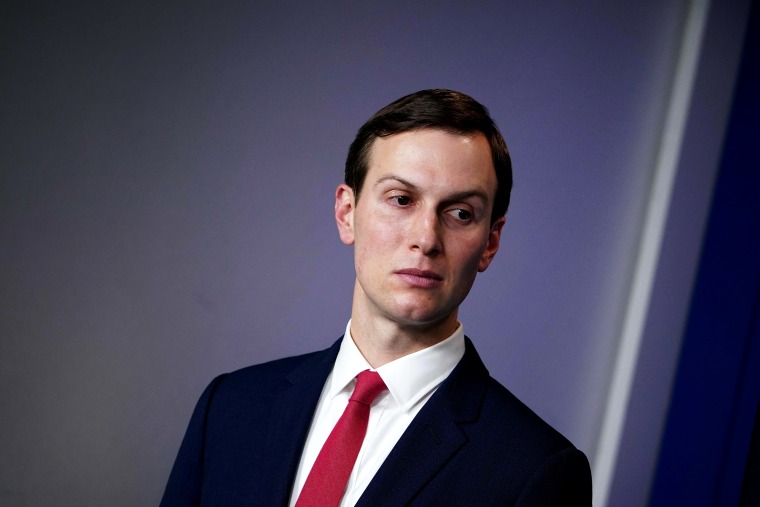The co-founder of a huge private equity firm sent an email this week to Jared Kushner and other Trump administration policymakers seeking to relax rules on coronavirus relief money in a way that would benefit the company, according to sources familiar with the matter.
Kushner's family real estate business has financial ties to the company, Apollo Global Management.
A source close to Kushner says there was nothing remarkable about his receipt of the email, from Apollo co-founder Mark Rowan. Kushner gets hundreds of proposals from all sorts of people, the source said. But Apollo is not just any business: It made a $184 million loan in 2017 to Kushner Companies, the real estate company in which Jared Kushner, President Donald Trump's son-in-law and senior adviser, retains an interest.
The email obtained by NBC News went out to Apollo clients and other policymakers, the sources said. It makes a recommendation about a $100 billion loan program recently announced by the Federal Reserve to backstop lenders and investors — a program designed to inject cash into the financial system to prevent it from freezing up.
The details are complicated, but the program will make loans to the financial industry's holders of certain types of debt, including student, auto and credit card loans. Under the rules, the securities backed by the debt must have the highest rating, usually AAA. One big category of debt is not eligible: unsecured consumer loans.
Many investments held by Apollo — which calls itself "one of the world's largest alternative investment managers" — wouldn't qualify because they are higher risk and lower rated. In his email, Rowan makes the case to expand the lending under the program.
"Current TALF supports AAA which is EXACTLY WHERE SUPPORT IS NOT NEEDED," the email says, referring to the technical name of the program, Term Asset-Backed Securities Loan Facility. "TALF should be expanded to support a broad spectrum of investment grade obligations with guardrails and limitations as described."
Rowan adds, "There has been no MORAL HAZARD. We have a totally unique situation."
That is a reference to arguments made during the 2008 financial crisis against bailing out banks and Wall Street firms that had made bad investments in mortgage-backed securities. Critics said a "moral hazard" was created when the government essentially spared many banks the consequences of their bad decisions.
In a financial crisis caused by an unforeseen global pandemic, there is no moral hazard, Rowan argues. But others see it differently. They say some of Apollo's investments were extremely risky even without a pandemic. If the government backed them, it could be left holding the bag.
In a statement, Apollo did not dispute the authenticity of the email.
"Business leaders around the country are offering their best solutions on how we can come together to respond to the health crisis and restart our economy," the statement sad. "We are particularly concerned that the plumbing of the financial system is not operating. Apollo, among other voices — including insurance companies, retirement plans, and industry organizations — have been advocating for the broad application of TALF across the investment grade market, which would efficiently reach the largest number of companies and do the most good."
Apollo is no stranger to the Trump administration.
The New York Times reported that in November 2017, Apollo lent $184 million to Jared Kushner's family real estate firm, Kushner Companies, to refinance the mortgage on a Chicago skyscraper.
The Times said the loan came after Joshua Harris, a founder of Apollo, attended White House meetings and advised Trump administration officials on infrastructure policy.
He met several times with Kushner, three people familiar with the meetings told the Times. Among other things, the two men discussed a possible White House role for Harris, the Times reported.
The position never materialized.
Christine Taylor, a spokeswoman for Kushner Companies, told the Times that Kushner's White House role had not affected the company's relationships with financial institutions.
Through a spokesman, Kushner's attorney, Abbe Lowell, told the Times Kushner "has met with hundreds of business people." He said that Kushner "has taken no part of any business, loans or projects with or for" Kushner Companies since joining the White House and that he has followed ethics advice.
In the past, senior White House and Cabinet officials with large investments have put them in a blind trust. Hank Paulson, who was worth an estimated $500 million when he became Treasury secretary under George W. Bush in 2006, did that.
Kushner resigned from his family business and he plays no role in running the Kushner Companies, but he retains a portfolio of real estate investments through the firm. Ethics filings showed that real estate holdings and other investments held by Kushner and his wife Ivanka Trump in 2017 were worth as much as $811 million.
President Trump also has elected not to use a blind trust, and retains financial stakes in his family real estate businesses.
Ken Dilanian reported from Washington.


